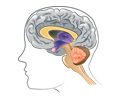All adults with endocrine disorders should be tested for high cholesterol and triglycerides to evaluate their risk of heart attack or stroke, stated new research.

TOP INSIGHT
All adults with endocrine disorders should be tested for high cholesterol and triglycerides to evaluate their risk of heart attack or stroke.
The guideline has three main objectives for patients with endocrine diseases:
- Describe lipid abnormalities and cardiovascular risk.
- Assess whether endocrine disorder treatment improves the lipid profile and/or lowers heart disease risk.
- Discuss the evidence for using cholesterol and triglyceride-lowering medications, in addition to diet and exercise.
- Obtain a lipid panel and evaluate heart disease risk factors in adults with endocrine disorders.
- Start statins in type 2 diabetes patients and risk factors for cardiovascular disease.
- Consider statin therapy in type 1 diabetes adults with obesity, vascular complications, or 20-year history of diabetes.
- Rule out hypothyroidism before treatment with lipid-lowering drugs.
- Monitor the lipid profile in adults with Cushing's syndrome, and consider statin treatment in addition to lifestyle modifications.
- Use statins to treat high cholesterol or triglycerides in post-menopausal women.
- Evaluate and treat lipids and other cardiovascular risk factors in women who enter menopause early.
Source-Medindia
 MEDINDIA
MEDINDIA




 Email
Email










